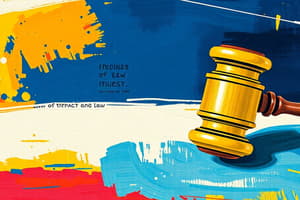Podcast
Questions and Answers
What circumstance allows for a person to be held responsible for unforeseen events?
What circumstance allows for a person to be held responsible for unforeseen events?
- There was negligence involved.
- The event was foreseeable and preventable.
- The agreement between parties explicitly states otherwise. (correct)
- There are explicit provisions in the law. (correct)
What presumption arises when a creditor receives the principal without any reservations about interest?
What presumption arises when a creditor receives the principal without any reservations about interest?
- The interest has been paid. (correct)
- Further payments are no longer necessary.
- The principal is not required to be returned.
- The interest has not been paid.
What does Article 1177 allow creditors to do in case of a debtor's default?
What does Article 1177 allow creditors to do in case of a debtor's default?
- Sell the debtor's property without legal proceedings.
- Exercise the debtor's rights and take legal actions to satisfy their claims. (correct)
- Negotiate directly with the debtor's creditors.
- Void the debtor's prior transactions automatically.
Under what condition can rights acquired through obligations become non-transmissible?
Under what condition can rights acquired through obligations become non-transmissible?
How does Article 1175 treat usurious transactions?
How does Article 1175 treat usurious transactions?
What happens when the obligor violates an obligation that consists of not doing something?
What happens when the obligor violates an obligation that consists of not doing something?
Under what conditions does delay exist without a demand from the creditor?
Under what conditions does delay exist without a demand from the creditor?
In reciprocal obligations, when does one party begin to incur delay?
In reciprocal obligations, when does one party begin to incur delay?
What type of responsibility arises from fraud in the performance of obligations?
What type of responsibility arises from fraud in the performance of obligations?
How is liability for negligence in performance managed according to the law?
How is liability for negligence in performance managed according to the law?
What constitutes negligence on the part of the obligor?
What constitutes negligence on the part of the obligor?
What is true about waiving an action for future fraud?
What is true about waiving an action for future fraud?
What standard of diligence is expected if not explicitly stated in the law or contract?
What standard of diligence is expected if not explicitly stated in the law or contract?
What constitutes an obligation according to Article 1156?
What constitutes an obligation according to Article 1156?
From which of the following can obligations arise, as stated in Article 1157?
From which of the following can obligations arise, as stated in Article 1157?
What is stated in Article 1158 regarding obligations derived from law?
What is stated in Article 1158 regarding obligations derived from law?
According to Article 1159, obligations arising from contracts are characterized by which of the following?
According to Article 1159, obligations arising from contracts are characterized by which of the following?
What does Article 1163 specify regarding the care of a thing that is to be given?
What does Article 1163 specify regarding the care of a thing that is to be given?
In the case of a determinate thing, what rights does the creditor have according to Article 1165?
In the case of a determinate thing, what rights does the creditor have according to Article 1165?
What does Article 1165 imply about the responsibilities of a debtor in case of delay or multiple promises?
What does Article 1165 imply about the responsibilities of a debtor in case of delay or multiple promises?
According to Article 1166, what does the obligation to give a determinate thing include?
According to Article 1166, what does the obligation to give a determinate thing include?
Flashcards
What is an obligation?
What is an obligation?
A juridical necessity to give, do, or not do.
Sources of obligations
Sources of obligations
Law, contracts, quasi-contracts, acts/omissions punished by law, and quasi-delicts.
Obligations from law
Obligations from law
They're not presumed; they must be expressly determined by law.
Contractual obligations
Contractual obligations
Signup and view all the flashcards
Quasi-contract obligations
Quasi-contract obligations
Signup and view all the flashcards
Obligations from criminal offenses
Obligations from criminal offenses
Signup and view all the flashcards
Creditors' rights to fruits
Creditors' rights to fruits
Signup and view all the flashcards
Duty of diligence
Duty of diligence
Signup and view all the flashcards
Delivery obligations
Delivery obligations
Signup and view all the flashcards
Liability for loss before delivery
Liability for loss before delivery
Signup and view all the flashcards
Failure to perform
Failure to perform
Signup and view all the flashcards
Acting against a prohibition
Acting against a prohibition
Signup and view all the flashcards
When does delay begin?
When does delay begin?
Signup and view all the flashcards
Delay in reciprocal obligations
Delay in reciprocal obligations
Signup and view all the flashcards
Liability for damages
Liability for damages
Signup and view all the flashcards
Standard of care
Standard of care
Signup and view all the flashcards
Liability for unforeseen events
Liability for unforeseen events
Signup and view all the flashcards
Usurious transactions
Usurious transactions
Signup and view all the flashcards
Payment presumptions
Payment presumptions
Signup and view all the flashcards
Creditor rights
Creditor rights
Signup and view all the flashcards
Transmission of rights
Transmission of rights
Signup and view all the flashcards
Study Notes
Obligation Overview
- An obligation is a juridical necessity to either give, do, or refrain from doing something.
Sources of Obligations
- Obligations can arise from various sources: law, contracts, quasi-contracts, acts punished by law, and quasi-delicts.
Legal Framework
- Obligations from law are not presumed; they must be explicitly defined by law or special statutes.
- Contractual obligations are binding and must be performed in good faith.
Quasi-Contracts & Criminal Offenses
- Obligations from quasi-contracts adhere to specific provisions in the Civil Code of the Philippines.
- Civil obligations resulting from criminal offenses are governed by penal laws and relevant provisions on damages.
Duties of the Obligor
- Creditors are entitled to the fruits of the object of the obligation from the moment it arises, but do not gain real rights until delivery occurs.
- Obligors must care for the item being delivered with the diligence of a good father of a family unless stated otherwise.
Delivery of Obligations
- If the obligation pertains to a determinate thing, the creditor can compel delivery; for indeterminate things, the obligation can be fulfilled at the debtor's expense.
- Obligors are liable for any loss of the item until delivery if they have promised it to multiple parties or delayed delivery.
Execution of Obligations
- If an obligor fails to perform as required, the obligation can be carried out at his expense, and poorly performed obligations may need to be undone.
- If the obligor acts contrary to a prohibition, they must undo their actions at their cost.
Delay in Performance
- Delay begins when the creditor demands fulfillment, except in certain circumstances such as contract provisions or inability to perform.
- For reciprocal obligations, neither party incurs delay if the other fails to meet their obligations promptly.
Liability and Damages
- Obligors found guilty of fraud, negligence, or delay are responsible for damages caused.
- Some responsibilities arising from negligence are subject to judicial regulation based on specific circumstances.
Negligence and Diligence
- The standard of care expected from the obligor relates to the obligation’s nature and circumstances. A "good father of a family" standard is applied if no specific diligence is outlined.
Unforeseen Events
- No liability arises for events that cannot be foreseen or were inevitable, except when explicitly stated by law or agreement.
Usurious Transactions
- Special laws govern transactions that involve usury.
Presumptions in Payment
- Receipt of principal by creditors without interest reservation presumes interest payment. Similarly, receiving later installments without prior reservations infers earlier payments are settled.
Creditor Rights
- Creditors can pursue a debtor’s properties to satisfy claims and have the right to challenge the debtor’s actions intended to defraud them.
Transmission of Rights
- Rights acquired through obligations are generally transmissible unless there is a stipulation that states otherwise.
Studying That Suits You
Use AI to generate personalized quizzes and flashcards to suit your learning preferences.




